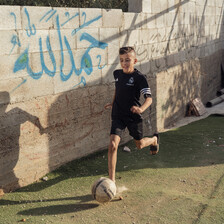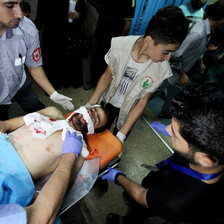The Electronic Intifada 2 April 2018

Abdel Raouf al-Balawi, 13, said that being released from Israeli prison “felt like I was leaving hell and being welcomed into paradise.”
Abdel Raouf al-Balawi’s mother drapes a checkered scarf – or kuffiyeh – around her son’s small, slumped-over shoulders, while the 13-year-old anxiously recounts his experiences in Israeli detention.
Posters displaying the faces of Palestinians killed by Israeli forces are lined up, one after the other, across the white walls of the family’s home in Bethlehem’s Dheisheh refugee camp.
“The food was horrible in prison,” Abdel Raouf said, looking up briefly, before averting his eyes back to the floor. “Everything the Israelis gave us was months expired.”
On Tuesday, 27 March, Abdel Raouf was released from Ofer detention center, an Israeli military facility located near Ramallah in the occupied West Bank, and was greeted by hundreds of cheering residents in his home camp celebrating his release.
Abdel Raouf was one of the youngest Palestinians imprisoned by Israel.
“I felt so much pain”
He was detained during a 10 December protest in Bethlehem against US President Donald Trump’s decision to recognize Jerusalem as the capital of Israel.
According to Abdel Raouf, at least 10 soldiers rushed the crowd of protesters and grabbed him.
“One of the soldiers threw me to the ground, and another began beating me on my legs,” he told The Electronic Intifada. “I couldn’t walk for a month because I felt so much pain in my leg from the beating.”
Following his detention, the minor was brought to an interrogation facility in Israel’s Gush Etzion settlement bloc. Like all Israeli settlements in the West Bank, Gush Etzion is illegal under international law.
Hours of interrogations with Israeli authorities followed, Abdel Raouf told The Electronic Intifada, as Israeli officials accused Abdel Raouf of throwing stones at Israeli forces during the protest.
It was five hours before his father was called and told his whereabouts. Palestinian parents are frequently denied the right to accompany their children during interrogations conducted by the Israeli authorities in the West Bank.
During the interrogations, soldiers placed Abdel Raouf in a room decorated with flags and posters of Hamas. “I think it was the soldiers’ attempts to intimidate me psychologically,” the boy said.
The al-Balawi family is affiliated with the rival Fatah party.
“They showed me a video of the protest and told me that I appeared in it. I kept telling them I was innocent,” he explained.
One of the Israeli officials threw a pen in the boy’s face and then pushed him off his chair, Abdel Raouf said.
And when his father arrived, the interrogators refocused their frustrations on him.
“They were screaming at my father, and my father was screaming back at them,” Abdel Raouf said. “One of the soldiers pointed his gun at my father and told him: ‘Get outside or I will shoot you.’”
After his father was forced to leave the interrogation room, Abdel Raouf was left alone for another two hours with the Israeli officials. “They just kept taking my fingerprints and telling me that I am Hamas and I want to kill them,” he told The Electronic Intifada.
Abdel Raouf soon confessed to throwing stones at Israeli forces. “I was scared that they would hurt my father, so I confessed,” he said.
Such treatment is routine for Palestinians, according to Dawoud Yusef from Addameer, a group campaigning on behalf of prisoners.
Palestinian minors are often forced to sign confessions written in Hebrew, a language most Palestinians in the West Bank do not understand, according to Yusef. Israeli interrogation and detention practices used on Palestinian minors, he added, clearly violate international law.
“Constantly worrying”
Abdel Raouf was sentenced to four months in prison on 22 January for throwing stones at Israeli soldiers – the most common charge leveled against Palestinian minors. A $1000 fine was also imposed on him.
“I felt so worried and sad when my son was in prison,” Abdel Raouf’s mother, Shahrazad, told The Electronic Intifada. “I was a mess for months. Every time I fell asleep, I dreamed of him. I was constantly worrying about him.”
It was not the first time Shahrazad had to deal with having one of her children imprisoned by Israel. Her other son, she said, 23-year-old Alaa has been imprisoned for almost a year under administrative detention – the widespread Israeli practice in occupied territory of imprisonment without charge or trial.
Even at the young age of 13, Abdel Raouf is no stranger to Israeli prison and violence. He easily reels off the names of friends and relatives who have been imprisoned or injured by Israel, counting them one by one on his fingers.
According to Addameer, there were 330 Palestinian minors imprisoned by Israel as of February.
Still, he said he was hugely relieved to be out of detention. “It felt like I was leaving hell and being welcomed into paradise when they released me,” he said.
However, Yusef told The Electronic Intifada that the experience of prison on Palestinian minors can affect them long after being released.
Prison can “radically change the personality of a child,” Yusef said, adding that Palestinian children often experience sleep issues, anxiety and difficulty concentrating following their release.
They also face serious problems readjusting to school. As a result, Palestinian children who have spent time in Israeli prison experience high dropout rates, Yusef said.
Despite the difficulties he may face in the future owing to his experience, Abdel Raouf is eager to return to his old life.
“I missed all my friends so much,” he said. “And I am very excited to be able to return to school.”
Jaclynn Ashly is a journalist based in the West Bank.
Editor’s note: An earlier version of this article misstated the amount of the Israeli fine imposed on Abdel Raouf al-Balawi.




